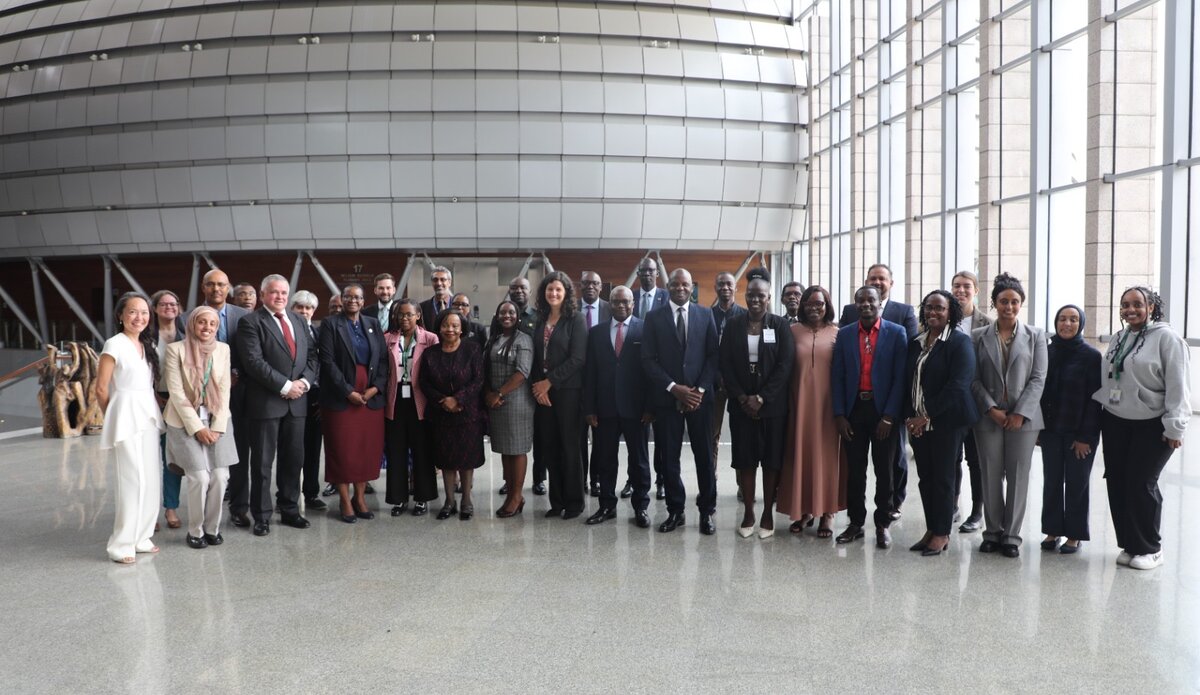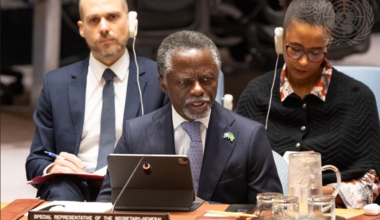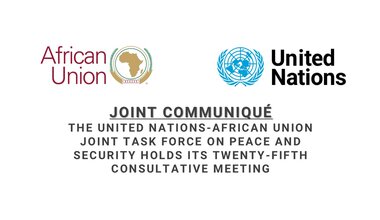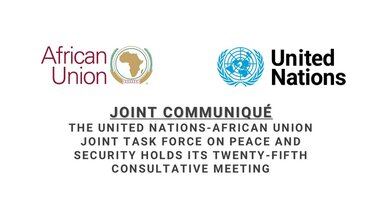AU Concludes High-Level Consultative Workshop on the Political Dimensions of DDR
The African Union (AU), in collaboration with the UN Department of Peace Operations (UNDPO), UN Office to the African Union (UNOAU), and the Berghoff Foundation, has successfully concluded the Consultative Workshop on the Political Dimensions of Disarmament, Demobilization, and Reintegration (DDR) at the AU Headquarters from 19-20 March 2025 in Addis Ababa, Ethiopia.
Over the past two days, AU Member States Experts, Regional Economic Communities (RECs), AU Missions, specialized training institutions, representatives of Centres of Excellence, and international partners engaged in focused discussions on integrating politically informed DDR strategies into broader peace processes, conflict resolution efforts, and governance reforms. The workshop underlined that DDR, beyond its technical components emphasizes its political significance. Discussions were guided by the Integrated DDR Standards (IDDRS) Module 2.20, which outlines the role of DDR in shaping political settlements and long-term peace.
Core highlights from the workshop include: (i) DDR as a Political Instrument – participants reaffirmed that DDR is not just about disarmament; it must be embedded in mediation, peace negotiations, and governance reforms to be effective; (ii) addressing Political Grievances – Armed groups often emerge from political exclusion and economic marginalization. The workshop emphasized the need for inclusive governance, power-sharing mechanisms, and sustainable reintegration; (iii) Regional Cooperation – With conflicts transcending national borders, AU, RECs/RMs and AU Missions committed to enhancing cross-border collaboration on DDR; (iv) ensuring sustainable reintegration – DDR must be linked to economic recovery, education, and civic participation to prevent relapse into violence; and, (v) Women & Youth in DDR – Special focus was placed on the inclusion of women and youth in DDR as active agents in peace processes, reinforcing commitments to gender-sensitive and youth-inclusive DDR programs.
Ms. Vanessa Prinz, First Secretary on Political Affairs, German Embassy, highlighted the role of multilateral partnerships in ensuring DDR success. "DDR must not be treated as a mere technical process. Political grievances must be addressed to prevent the resurgence of violence. Germany remains committed to supporting DDR initiatives in Africa."
Mr. Sergiusz Sidorowicz, Policy and Planning Officer, UNDPO emphasized that DDR is no longer just a technical disarmament process but a deeply political endeavor that shapes the balance of power in conflict and post-conflict settings. "Politics is the missing puzzle piece in DDR today. In fragmented and protracted conflicts, DDR’s success depends on political commitment, state legitimacy, and inclusivity. This workshop is about identifying and resolving those political blockages."
Dr.Veronique Dudouet, Senior Advisor at the Berghof Foundation, reinforced the workshop's goal to bridge the gap between political transformation and DDR processes. "DDR is inherently political. From our two decades of work with NSAGs across Africa, we’ve learned that sustainable disarmament only happens when political incentives, reforms, and pathways to civic participation are in place. This workshop fosters exactly the kind of cross-sectoral reflection and collaboration needed for long-term peace."
Hon. Lady Justice (Rtd) Effie Owuor, Chairperson of the AU Panel of the Wise, highlighted the crucial role of DDR in reshaping societies, emphasizing that DDR is not just about disarmament but about ensuring combatants see a viable future in inclusive governance. "DDR must be perceived as credible, just, and inclusive. It must honor commitments made during peace negotiations and be linked to broader reforms in governance, justice, and economic recovery."
In her opening remarks, Ms. Patience Chiradza, Director, Governance and Conflict Prevention Directorate, AU, stressed that DDR is a deeply political process that must be aligned with mediation efforts, political settlements, and peace agreements. "DDR must be driven by political will and national ownership. It should integrate security sector reform, governance transitions, and social cohesion to create lasting peace."
At the conclusion of the workshop, participants committed to (i) enhancing AU’s engagement in politically driven DDR through capacity-building and policy guidance; (ii) developing tailored DDR strategies for specific conflict contexts, ensuring alignment with AU-led mediation and peace processes; (iii) strengthening partnerships between AU, RECs, and international actors for more coordinated DDR efforts across the continent; and, (iv) advancing knowledge-sharing platforms and follow-up consultations to deepen understanding of the political dimensions of DDR.
The workshop marks a significant milestone in shaping DDR as a politically strategic tool for peace and security in Africa. Moving forward, the AU and its partners will work towards operationalizing these discussions into concrete policy and programmatic action across the continent.
Source: AU Concludes High-Level Consultative Workshop on the Political Dimensions of DDR-African Union - Peace and Security Department
 UN
UN






